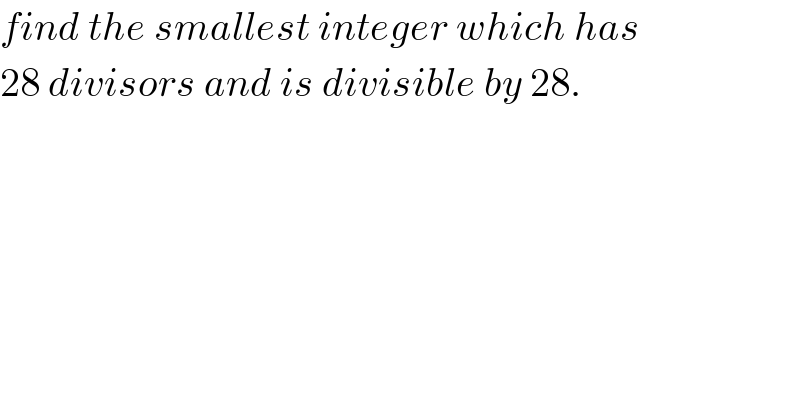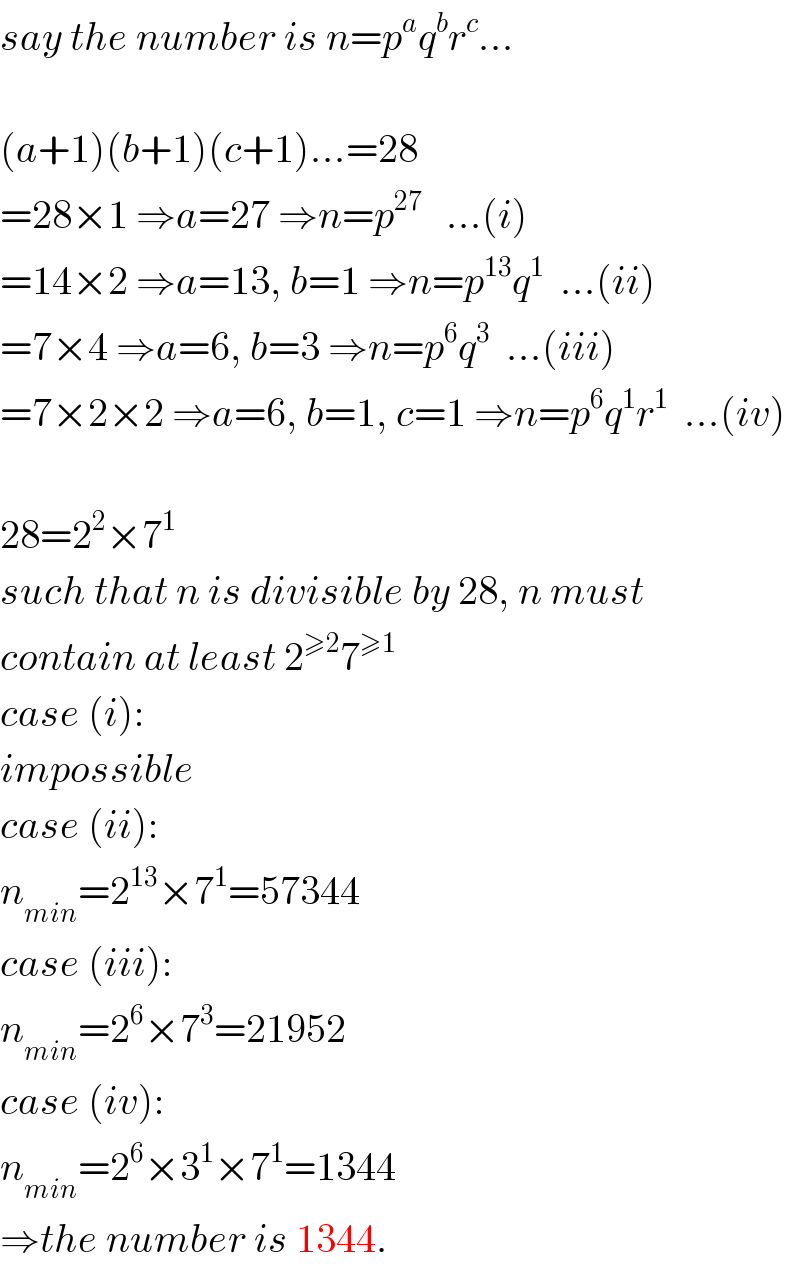Question Number 124567 by mr W last updated on 04/Dec/20

$${find}\:{the}\:{smallest}\:{integer}\:{which}\:{has} \\ $$$$\mathrm{28}\:{divisors}\:{and}\:{is}\:{divisible}\:{by}\:\mathrm{28}. \\ $$
Answered by mr W last updated on 05/Dec/20

$${say}\:{the}\:{number}\:{is}\:{n}={p}^{{a}} {q}^{{b}} {r}^{{c}} … \\ $$$$ \\ $$$$\left({a}+\mathrm{1}\right)\left({b}+\mathrm{1}\right)\left({c}+\mathrm{1}\right)…=\mathrm{28} \\ $$$$=\mathrm{28}×\mathrm{1}\:\Rightarrow{a}=\mathrm{27}\:\Rightarrow{n}={p}^{\mathrm{27}} \:\:\:…\left({i}\right) \\ $$$$=\mathrm{14}×\mathrm{2}\:\Rightarrow{a}=\mathrm{13},\:{b}=\mathrm{1}\:\Rightarrow{n}={p}^{\mathrm{13}} {q}^{\mathrm{1}} \:\:…\left({ii}\right) \\ $$$$=\mathrm{7}×\mathrm{4}\:\Rightarrow{a}=\mathrm{6},\:{b}=\mathrm{3}\:\Rightarrow{n}={p}^{\mathrm{6}} {q}^{\mathrm{3}} \:\:…\left({iii}\right) \\ $$$$=\mathrm{7}×\mathrm{2}×\mathrm{2}\:\Rightarrow{a}=\mathrm{6},\:{b}=\mathrm{1},\:{c}=\mathrm{1}\:\Rightarrow{n}={p}^{\mathrm{6}} {q}^{\mathrm{1}} {r}^{\mathrm{1}} \:\:…\left({iv}\right) \\ $$$$ \\ $$$$\mathrm{28}=\mathrm{2}^{\mathrm{2}} ×\mathrm{7}^{\mathrm{1}} \\ $$$${such}\:{that}\:{n}\:{is}\:{divisible}\:{by}\:\mathrm{28},\:{n}\:{must} \\ $$$${contain}\:{at}\:{least}\:\mathrm{2}^{\geqslant\mathrm{2}} \mathrm{7}^{\geqslant\mathrm{1}} \\ $$$${case}\:\left({i}\right): \\ $$$${impossible} \\ $$$${case}\:\left({ii}\right): \\ $$$${n}_{{min}} =\mathrm{2}^{\mathrm{13}} ×\mathrm{7}^{\mathrm{1}} =\mathrm{57344} \\ $$$${case}\:\left({iii}\right): \\ $$$${n}_{{min}} =\mathrm{2}^{\mathrm{6}} ×\mathrm{7}^{\mathrm{3}} =\mathrm{21952} \\ $$$${case}\:\left({iv}\right): \\ $$$${n}_{{min}} =\mathrm{2}^{\mathrm{6}} ×\mathrm{3}^{\mathrm{1}} ×\mathrm{7}^{\mathrm{1}} =\mathrm{1344} \\ $$$$\Rightarrow{the}\:{number}\:{is}\:\mathrm{1344}. \\ $$
